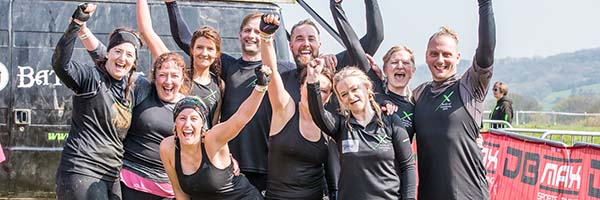Obstacle course racing is a physically demanding sport that requires strength, endurance, and mental toughness. To perform at your best, you need to fuel right. In this blog, we’ll explore the best nutrition strategies for optimal performance.
The Importance of Nutrition in OCR
Before we dive into the specifics of nutrition for OCR, it’s important to understand why it’s so critical. First and foremost, OCR is a high-intensity activity that places significant demands on the body. To perform at your best, you need to ensure that your body has enough fuel to sustain the energy needed to complete the race. And chances are your OCR will last longer than 30-minutes – the point beyond which you really want to consider adding some exogenous (sourced from outside the body) fuel. Additionally, proper nutrition helps to reduce the risk of injury, aids in recovery, and supports overall health and wellness.
Carbohydrates: The Key to Fuelling
When it comes to OCR, carbs are king. They are your primary fuel source for high-intensity exercise and are essential if you want to perform your best (and enjoy the experience!). In fact, research shows that a high-carbohydrate diet can improve endurance and delay fatigue during exercise. So, what are the best sources of carbohydrates for OCR?
Complex carbohydrates such as whole grains, fruits, and vegetables, are the best choice for day to day OCR training. They’re healthy, filling and provide slow-release energy to help you get through sessions and recover. Compared to simple carbs, they’re packed with vitamins and minerals to support health. While simple carbs are a good in-race fuel (we’ll get to that in a mo), you should largely avoid them during training because of their impact on your overall health.
Protein: Supporting Muscle Growth and Repair
While carbohydrates are critical for energy, protein is essential for supporting muscle growth and repair. During OCR training, your muscles are put through significant stress and protein is needed to rebuild and repair them. Additionally, protein can help to reduce muscle soreness and aid in recovery after the race. This makes consistent training easier to achieve.
The best sources of protein include:
- lean meats
- poultry
- fish
- eggs
- plant-based sources such as beans, legumes, and tofu
Aim for a balance of both animal and plant-based sources to ensure you’re getting all of the essential amino acids needed for muscle growth and repair.
Hydration
Staying hydrated is critical for optimal performance during OCR but is often neglected. Dehydration can lead to fatigue, muscle cramps and impaired cognitive function. In fact, even very mild dehydration can negatively impact performance so it’s essential to stay on top of your hydration during the race.
This begins pre-race: ensure you’re well hydrated before the start and you’ll have won 50% of the battle. Continue sipping fluids durig the event. Water is the best choice for staying hydrated but sports drinks can also be beneficial as they provide electrolytes that are lost through sweat.
Mid-OCR Fuelling
During the race, it’s wise to consume some carbs to maintain energy and prevent fatigue. Aim to consume around 30-60 grams of carbohydrates per hour of racing, depending on your body weight and the intensity of the race.
Mid-OCR, you’ll want to focus primarily on easily digestible (ie, simple) carbohydrates. Not only is it practically difficult to wolf down a whopping flapjack while hurdling an obstacle, but simple carbs will provide a quick source of energy and prevent your body from relying solely on glycogen stores.
If you prefer solid foods, this means energy bars, bananas or even jelly babies. If you’d rather go more liquid-based, then energy gels and even energy drink in a small soft flask can give you a little boost. Whatever you choose, the most important thing is to test your fuelling strategy during training sessions to ensure it doesn’t disrupt your gut. There’s nothing worse than having to queue for a portaloo when you really need to go.
Drink plenty of fluids before, during, and after the race to prevent dehydration and, if practical, carry a hydration pack or soft flask to sip on at regular intervals. This is especially important, obviously, if it’s a very hot day.
Electrolytes such as sodium, potassium, and magnesium are key minerals for proper muscle and nerve function and are easily consumed in a sports drink or an effervescent tab disolved in water. Don’t worry too much if you can’t get these in during the event, but it’d be worth it after for sure.
Lastly, depending on the duration (and your competitive spirit!) of the event, but caffeine has been shown to improve performance and delay fatigue which would be especially handy during a longer OCR. However, it is important not to overdo it, as too much caffeine can cause dehydration and other negative side effects.
Back to Blog



